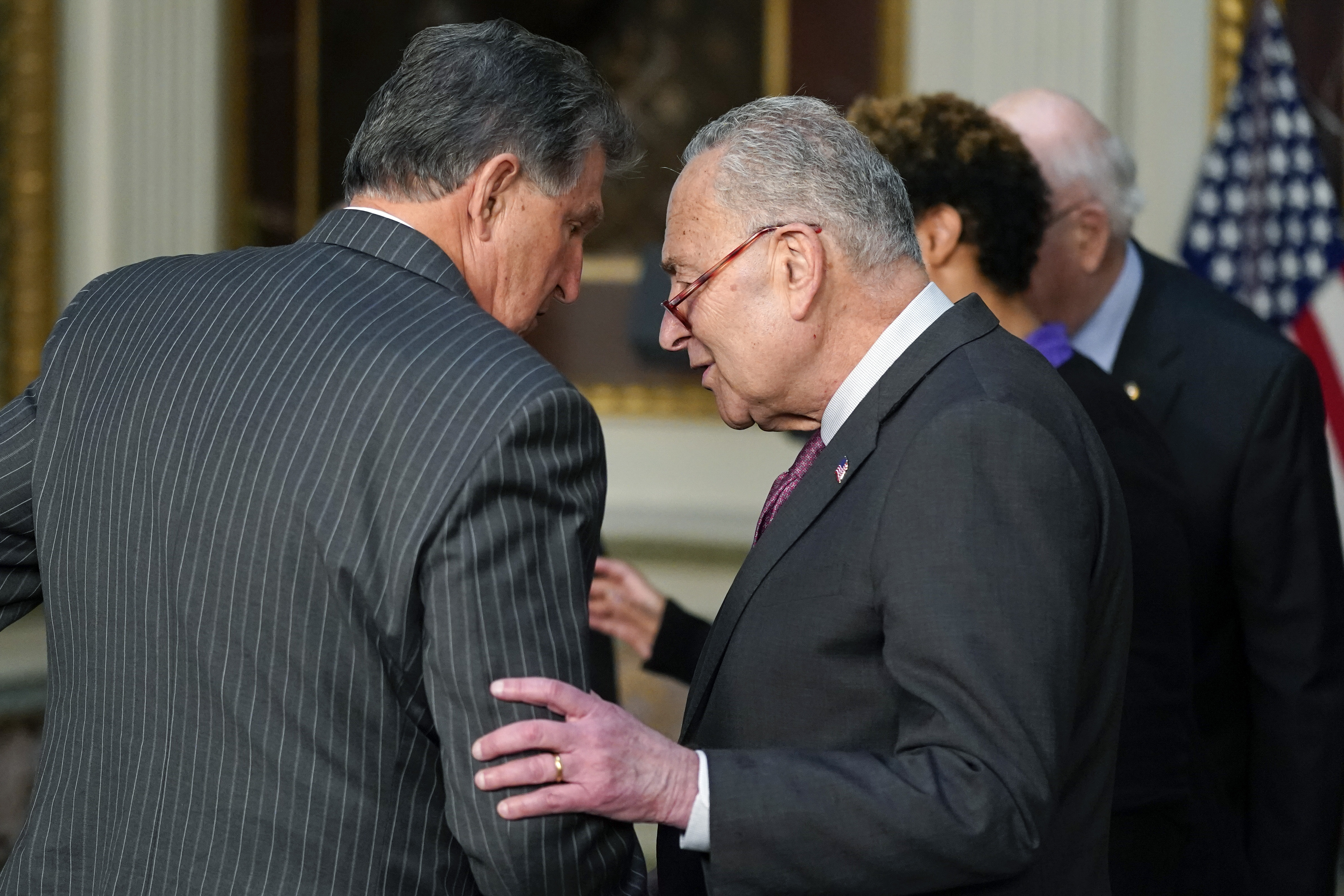Here’s what to know about the Manchin-Schumer tax deal

Democrats may be shocked by the last-minute tax deal announced Wednesday by Sen. Joe Manchin and Majority Leader Chuck Schumer, but it is nevertheless a far cry from the sprawling slate of tax increases they had once hoped to approve.
Gone are ambitious proposals to begin taxing the unrealized capital gains of the uber rich or at least hit them with new surtaxes. Also out is the Treasury Department’s top priority: Tax increases on big corporations needed to bring the U.S. into compliance with a global tax deal.
Even seemingly uncontroversial proposals, like a plan to begin taxing stock buybacks — which had drawn yawns on Wall Street — were deleted.
Out of more than 40 tax increases Democrats had seriously considered, the plan includes just two, according to a summary provided by Manchin’s office — one imposing a new type of minimum tax on big companies, and a plan to squeeze the so-called carried interest loophole, something Democrats have been trying to eliminate for years.
Alongside that is a proposal to beef up IRS enforcement, which budget scorekeepers would also generate savings to the government.
While the fine print has yet to be shared, here are three things to know about the tax agreement:
NEW MINIMUM TAX ON BIG BIZ: The proposal would create a new 15 percent minimum tax on big corporations. Details are still sketchy, but it’s aimed at companies that report big profits to Wall Street but appear to pay little or nothing to the IRS.
“It is commonsense that a domestic corporate minimum tax of 15 percent be applied only to billion-dollar companies,” said Manchin (D-W.Va.).
This proposal has taken a lot of fire from tax experts who view it more as a soundbite for politicians than a serious tax proposal. They say there are legitimate reasons why companies would tell investors one thing and the IRS another, not least of which is companies are required to use different accounting rules when reporting to the Securities and Exchange Commission and to the IRS.
Critics note Congress has tried something like this before, back in the 1980s, and repealed it shortly thereafter.
Democrats were forced to turn to the proposal after Sen. Kyrsten Sinema (D-Ariz.) balked at their original plan to roll back the big cut in the corporate income tax pushed through by Republicans in 2017.
A number of industries have warned the plan would have unintended consequences and have been pleading for exemptions from the tax.
Green energy companies say they would lose writeoffs, undermining efforts to fight climate change. Manufacturers call it a backdoor repeal of popular depreciation deductions. Firms with pensions warn they would be hit, and state governments worry it could make the tax-exempt bonds they use to raise money less attractive.
CARRIED INTEREST: Democrats have been trying to close the so-called carried interest loophole for more than a decade but had been stymied by Wall Street lobbyists and, ironically, Schumer (D-N.Y.).
The much-criticized provision allows private equity firms and other money managers to treat part of their earnings as capital gains, which are subject to a top rate of 20 percent, instead of much higher ordinary income tax rates.
Republicans narrowed this break as part of their 2017 tax cuts, by making it harder to claim, though they too were unable to get rid of it altogether.
The attack on carried interest had been overshadowed by Democrats’ many other more ambitious plans to raise taxes on the rich, and it wouldn’t go nearly as far as their other proposals to dun the well-to-do that fell by the wayside.
But including it will at least allow Democrats to say they’re raising taxes on the rich, and they say it will generate $14 billion in savings to the Treasury.
BOOSTING TAX ENFORCEMENT: Increasing funding for the IRS is meant to bring in money to the federal treasury by giving the agency more muscle to go after unpaid taxes. Exactly how much more is subject to debate, and Democrats got into some big fights with Congress’s official scorekeepers over how much additional revenue they could book.
Manchin’s summary says they’re counting $124 billion in savings, though it’s unclear whether that’s net of their increase in the IRS’s budget, and a Manchin spokesman did not clarify. Regardless, it would be a fraction of the $400 billion the Biden administration had hoped to raise from increasing audits.
Go To Source
Author: POLITICO

